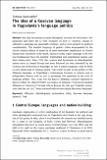Files in this item
The idea of a Kosovan language in Yugoslavia's language politics
Item metadata
| dc.contributor.author | Kamusella, Tomasz | |
| dc.date.accessioned | 2017-10-04T23:32:26Z | |
| dc.date.available | 2017-10-04T23:32:26Z | |
| dc.date.issued | 2016-11-01 | |
| dc.identifier | 247147002 | |
| dc.identifier | 8de65a70-6222-4b4a-a28b-bd129e93c32d | |
| dc.identifier | 84990879138 | |
| dc.identifier.citation | Kamusella , T 2016 , ' The idea of a Kosovan language in Yugoslavia's language politics ' , International Journal of the Sociology of Language , vol. 2016 , no. 242 , pp. 217-237 . https://doi.org/10.1515/ijsl-2016-0040 | en |
| dc.identifier.issn | 0165-2516 | |
| dc.identifier.other | ORCID: /0000-0003-3484-8352/work/42102715 | |
| dc.identifier.uri | https://hdl.handle.net/10023/11804 | |
| dc.description.abstract | Not only are nations invented (imagined) into and out of existence, but languages and states are as well. Decisions on how to construct, change or obliterate a language are essentially arbitrary, and as such dictated by political considerations. The entailed language of politics (often accompanied by the closely related politics of script) is of more immediate significance in Central Europe than elsewhere in the world, because in this region language is the sole and fundamental basis for creating, legitimating and maintaining nations and their nation-states. Since 1918, the creation and destruction of ethnolinguistic nation-states in Central Europe has been followed (or even preceded) by the creation and destruction of languages so that a unique language could be fitted to each nation and its national polity. This article focuses on the politics of the Albanian language in Yugoslavia's Autonomous Province of Kosovo and in independent Kosovo with an eye to answering two questions at the level of language politics. First, what was the kind of Albanian standard employed in Kosovo before the 1968/1970/1974 acceptance of Albania's Tosk-based standard Albanian in Yugoslavia? Second, why is Kosovo the sole post-Yugoslav nation-state that has not (yet?) been endowed with its own unique (Kosovan) language? | |
| dc.format.extent | 21 | |
| dc.format.extent | 1952612 | |
| dc.language.iso | eng | |
| dc.relation.ispartof | International Journal of the Sociology of Language | en |
| dc.rights | Copyright © 2016 by Walter de Gruyter GmbH. This work has been made available online in accordance with the publisher’s policies. This is the author created, accepted version manuscript following peer review and may differ slightly from the final published version. The final published version of this work is available at https://doi.org/10.1515/ijsl-2016-0040 | en |
| dc.subject | Albanian | en |
| dc.subject | Ethnolinguistic nationalism | en |
| dc.subject | Gheg | en |
| dc.subject | Kosovan language (project) | en |
| dc.subject | Tosk | en |
| dc.subject | P Philology. Linguistics | en |
| dc.subject | PG Slavic, Baltic, Albanian languages and literature | en |
| dc.subject | Language and Linguistics | en |
| dc.subject | Linguistics and Language | en |
| dc.subject.lcc | P1 | en |
| dc.subject.lcc | PG | en |
| dc.title | The idea of a Kosovan language in Yugoslavia's language politics | en |
| dc.type | Journal article | en |
| dc.contributor.institution | University of St Andrews.School of History | en |
| dc.identifier.doi | 10.1515/ijsl-2016-0040 | |
| dc.description.status | Peer reviewed | en |
| dc.date.embargoedUntil | 2017-10-04 |
This item appears in the following Collection(s)
Items in the St Andrews Research Repository are protected by copyright, with all rights reserved, unless otherwise indicated.

